It’s no secret that the internet has drastically transformed society. From social media changing the way we stay in touch with friends, to email reforming our business communication. Local marketing is no exception. In the past, phonebook listings and local adverts were some of the best ways to market businesses locally. These days, people are far more likely to search for local businesses online. This means the best way to advertise a local business is to make sure people can find it in online searches.
Search engine optimization (or SEO for short) has helped countless businesses attract clients. However, not all practices are the same. When looking at SEO, there’s a distinct difference between local SEO vs organic SEO. What your business needs most will depend on several factors, but a lot of businesses can benefit most from a combination local and organic SEO techniques.
What Is SEO for Businesses?
Before distinguishing between local and organic SEO, it’s important to have a basic understanding of what SEO entails. As the term “search engine optimization” suggests, SEO is the practice of improving a website with the goal of helping search engines list it.
Some common strategies to help a business website list in relevant searches include:
- Adding enough relevant keywords in the website content
- Establishing and managing a business social media presence
- Optimizing the company website to offer a user-friendly experience
- Listing a company in relevant business directories
This is only a short summary of what SEO entails. Entire books can be written on each one of the above-mentioned points. Search engine algorithms are always changing, and so SEO practices must also adapt to accommodate new criteria set by search engines for indexability.
Regardless, there are certain facets of SEO that remain stable. For instance, the inclusion of keywords in website content is always advantageous. Search engines scan website texts in order to find phrases and words relevant to searches. Although the use of relevant keywords isn’t the only thing search engines look at when choosing the most relevant search results, it will always remain an important part of SEO.
Local SEO vs Organic SEO: What’s the Difference?
Understanding the concept of SEO helps to distinguish between local and organic SEO techniques. Although both forms of SEO focus on helping a website list in searches, the main difference is the audience local SEO will attract vs organic SEO.
What is Local SEO?
Quite simply, local SEO is focused around helping a business attract website traffic from local searches. Local searches in this context simply means that the searches are specific to a location. The exact location of the search could be as broad as a whole country, or as narrow as a specific town.
Examples of local searches could include the following:
- Tourist attractions in the United States
- Car insurance in South Carolina
- Web design services in Miami, FL
The first example is a local search, but not a very specific one. Results will be relevant to the specific place mentioned in the search, but in this case the “place” in question is the whole US. As a result, listings could include geographic locations from any state or city. That’s not very helpful for someone looking to tour only a specific part of the country.
In the second example, the place mentioned in the search is the state of South Carolina. Getting listed for searches specific to a state is much more useful for most businesses. A lot of companies only operate in one state and are looking to attract customers from that region.
The third example focuses on both the state and the city in which the business operates. A lot of small to medium sized businesses only operate in one town or city. A local bakery, for instance, will target customers from the city where it operates. In such a case, there’s no use attracting potential customers that are too far out of the town where the business is located.
In practice, this means that local SEO aims to help local businesses attract clientele. Just how local the SEO will be, depends on the needs of a specific business.
What is Organic SEO?
Organic SEO is all about listing a website for specific keywords or phrases. Unlike with local SEO, the keywords you’re trying to list the website for might not be specific to a region.
Here are some examples of organic SEO keywords people might search for:
- How to get more sleep
- Best apple pie recipes
- Happy songs to listen to
The important thing here is that none of these search phrases target a specific place. They’re all general searches. People from all over the world could search for these things. The content a search engine lists in the results can also originate from any country.
Theoretically, organic SEO searches have the potential to bring in far more website traffic, but website visitors can be from any place in the world – not just locally.
For businesses, listing in organic searches often means to list in industry-specific searches rather than location-specific ones. A plumber might have website content that shows up in a search for “how to fix a leaky tap?”, for instance.
The benefit of listing for general search terms isn’t necessarily attracting more customers directly. Instead, having content that lists for industry-related search queries can help you establish yourself as an expert in your industry. In turn, this will cause potential customers to see your company as a trustworthy business in your industry.
The Difference Between Local SEO and Organic SEO Listings
Till now, the main focus was to explain the difference between local and organic SEO in terms of local vs general enquiries. However, there’s another difference between local and organic search – Google’s listing format.
When searching for a term such as “car insurance in South Carolina” Google has a special section to list local businesses that suit the criteria of the search. After these local results, there are also some normal Google listings, which you can find underneath the first three results.
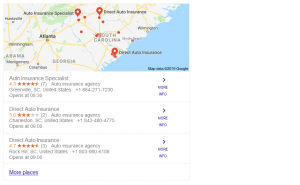
Google has a local listing format which is integrated with Maps and other Google services.
The first three listings are local businesses and they have a physical address linking to Google Maps – these are local listings. All the subsequent listings are location-specific organic listings. This can seem confusing at first. After all, can’t all listings for location-specific searches just be local listings?
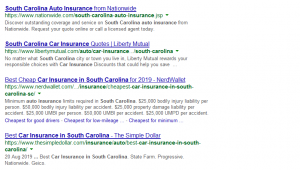
Google also has organic listings for location-specific searches. These listings will usually be relevant to a local search query, but they aren’t integrated with Maps.
To clear up the confusion, it’s important to understand that only Google has separate listing formats for local vs organic listings. Other search engines, such as DuckDuckGo and Bing only have the organic listings in their results.
Google’s “local listings” section is actually filled with results from a Google service called “Google My Business”. So actually “local listings” can also be called “Google My Business listings”. Essentially, the difference between local and organic listings is simply where Google gets them from.
Local listings are from Google My Business, specifically. When opened, a local listing will display a company’s Google My Business profile and its location on Google Maps.
Organic listings can be from all over the internet. Quite often, organic listings link directly to the websites of relevant local businesses. Organic listings can also link to social media profiles or online business directories.
More About Google My Business Listings
The Google My Business service is almost like Google’s own version of a business directory. It’s a service Google offers to help local businesses get found online. Google My Business is integrated with other Google services like Google Maps and Google Reviews. This allows customers to easily get a good overview of a local business. As an added benefit, a business can also link to their business website directly from the GMB listing.
The fact that Google My Business is integrated with Google Maps allows users to quickly search for local businesses. Google will then list results based on the location of the user in proximity to relevant local business. Users can then use their GPS on Maps to travel to the location of the address listed on Google for a specific business
Local SEO vs Organic SEO: What Does Your Business Need?
Understanding the difference between local and organic SEO can help you decide what’s best for your business. Generally though, a combination of both local and organic SEO is best.
Seeing as most search engines only have the organic listing section, showing up in location-specific organic results can boost your business substantially. Getting your business website listed for searches that are specific to both your industry and location is still considered local SEO. You’re targeting a local audience with local searches. It’s simply a form of local SEO which aims at improving where your website lists in organic results.
On the other hand, listing for search terms that are related to your industry rather than location is also helpful. Listing in results for common queries customers might have establishes your business website as a trustworthy source of information for both search engines and potential customers.
If more of your business website content appears in searches, your website will become more indexable for future searches as well. As a result, your website can also be more likely to appear in location-specific searches. So, to conclude, local and organic SEO practices and techniques can and ideally should compliment each other to help your business attract customers online.
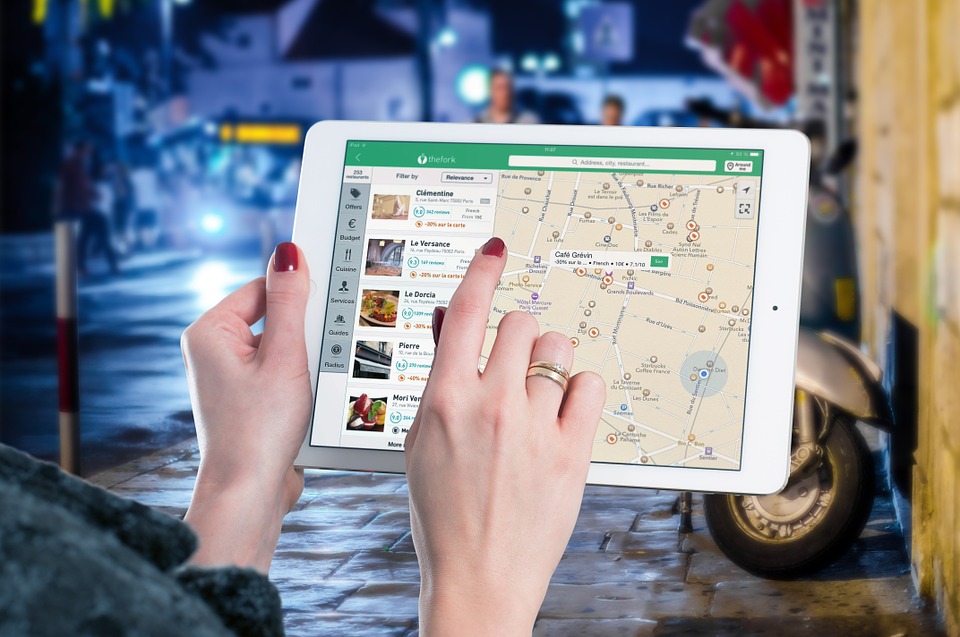


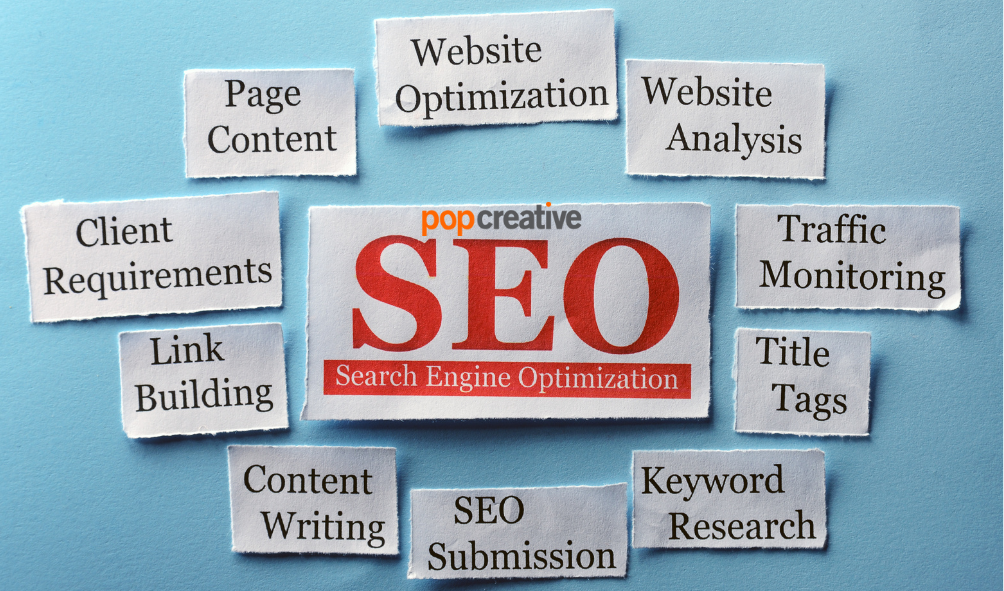

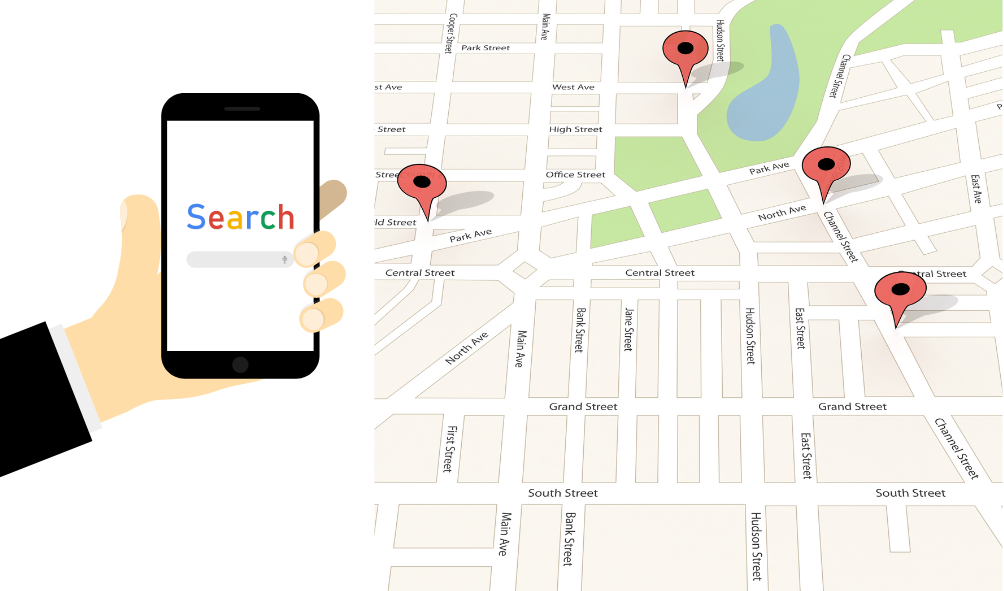
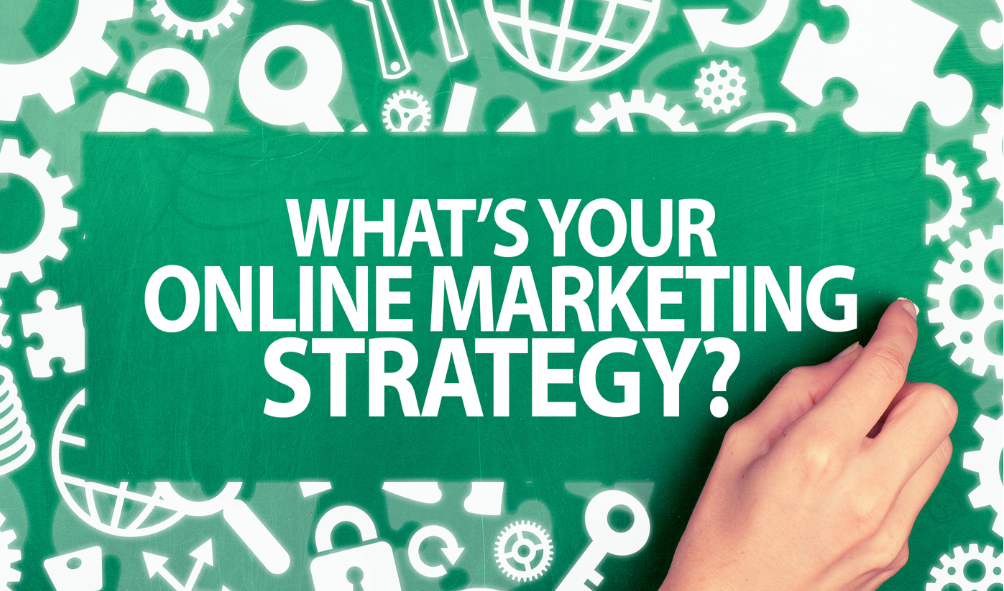
Recent Comments